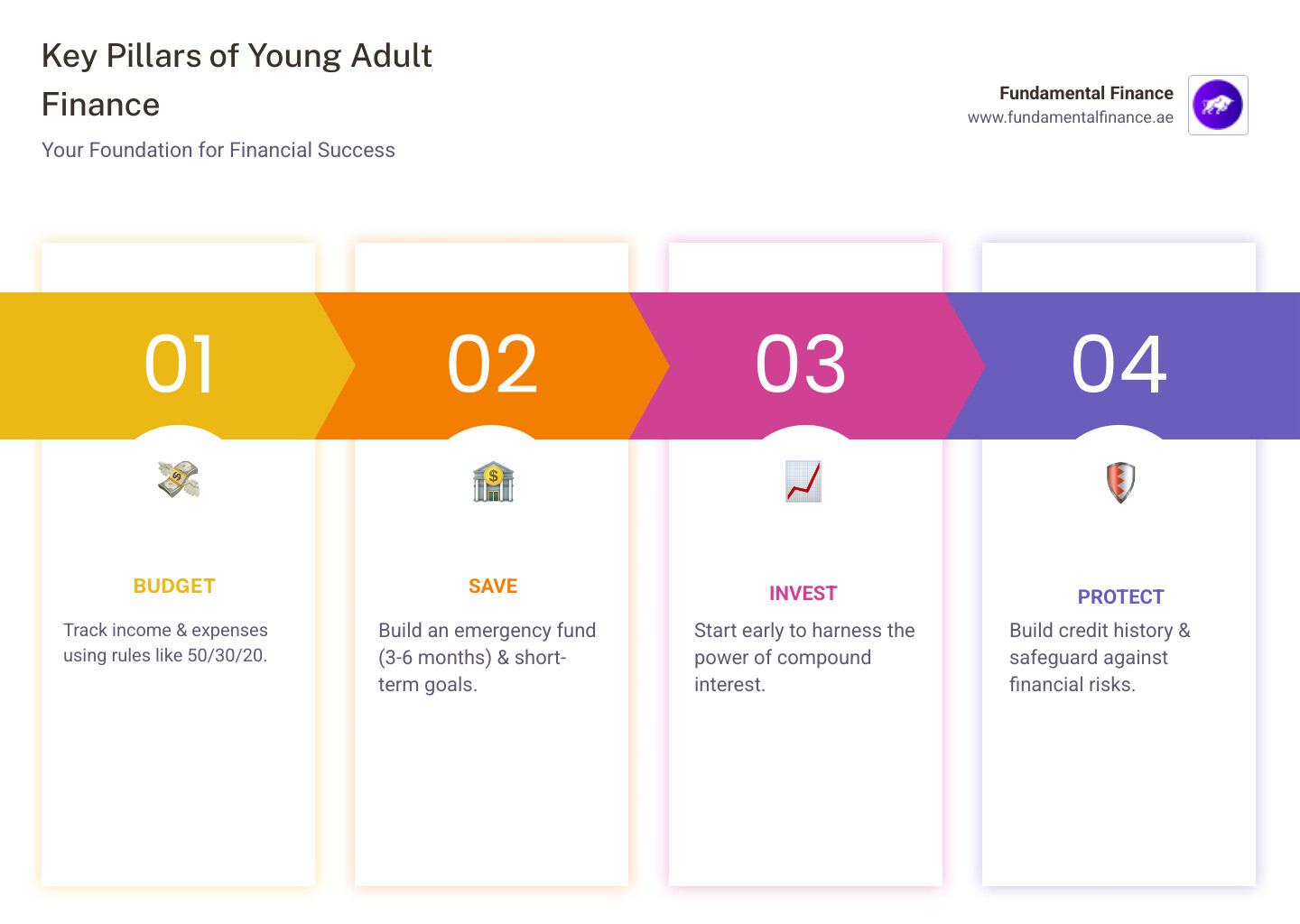Navigating Your Noughties: Smart Money Moves for Young Adults
Time to Read:
10

Your Financial Journey Starts Now
Young adult finance is the foundation that shapes your entire financial future. Yet, only 39% of young adults aged 18-29 have a budget, and 40% have less than $1,000 in savings.
Essential young adult finance fundamentals:
- Budget: Track income and expenses using the 50/30/20 rule
- Save: Build an emergency fund covering 3-6 months of expenses
- Invest: Start early to harness compound interest over decades
- Protect: Build credit history and safeguard against financial risks
- Plan: Set clear goals and create timelines for major purchases
Your twenties are your greatest financial asset—not because of how much money you have, but because of time. Every year you delay saving and investing costs you exponentially more in future wealth.
Consider this: if you start investing $150 per paycheck at age 25 with an 8% return, you'll have approximately $1.1 million after 40 years. Wait until 35, and you'll only have $490,000 after 30 years—a difference of over $600,000.
"Managing finances might not sound glamorous but getting it right early can prepare you for a lifetime of financial freedom."
The statistics can be sobering: the average student loan debt is $30,000, and 60% of young adults live paycheck to paycheck. But the good news is that financial literacy is learnable. You don't need to be a math genius; you just need to understand the basics and take action.

The Foundation: Budgeting and Mindful Spending
Budgeting is the cornerstone of young adult finance, but it's not about deprivation. Think of it as your financial GPS, helping you steer your money so you can reach your goals.

The First Step in Young Adult Finance: Creating a Budget That Works
A budget is a plan that tells your money where to go. It's crucial for gaining control over spending, achieving savings goals, avoiding debt, and building healthy habits. Start by tracking your income and all expenses—from coffee to subscriptions—to gain awareness of your spending patterns.
Once you see where your money is going, you can allocate it intentionally. A popular framework is the 50/30/20 rule: allocate 50% of your income to needs (rent, utilities), 30% to wants (dining out, entertainment), and 20% to savings and debt repayment. This simple yet flexible rule, which you can learn more about here, helps keep you on track.
Creating a budget doesn't have to be overwhelming. Technology can help. Our Budget Calculator helps you crunch the numbers.
Needs vs. Wants: The Core of Your Budget
A core budgeting skill is distinguishing between needs and wants. This is essential for mastering young adult finance.
Needs are non-negotiable essentials like rent, basic groceries, essential transportation, utilities, and necessary insurance. These must be paid first.
Wants are everything else that makes life more enjoyable but isn't essential, such as dining out, entertainment subscriptions, new gadgets, or travel. These shouldn't come at the expense of your financial stability.
The key is to cover your needs first, then allocate money for wants within your budget. This might mean making choices like cooking at home more often or waiting to upgrade your phone.
In the UAE, local customs can impact your budget. Knowing the tipping culture helps you plan for dining out. Our guide on Tipping in Dubai: What's Expected and How Much to Give can help, and our Tip Calculator for Splitting Tips with Friends makes dividing the bill easy.
Automating for Success
Once your budget is set, use automation to put your money management on autopilot. This reduces stress and increases your chances of success.
Setting up automatic bill pay for rent, utilities, and loan payments protects your credit score and eliminates late fees.
Even better, automate your savings transfers. Set up automatic transfers to your savings or investment accounts right after payday. This “pay yourself first” strategy treats savings like a non-negotiable bill.
Automation reduces financial stress by handling routine tasks in the background, letting you focus on living your life. Our FunFi app, with its AI assistant Toro, can help you set up these systems and track everything in one place.
Building Your Future: Saving and Investing
The journey of young adult finance isn't just about managing today's money; it's about building for the future through saving and investing.

The Power of Saving and Compound Interest
Saving is the bedrock of financial security, protecting you from unexpected events and helping you reach short-term goals.
- Emergency Funds: An emergency fund is non-negotiable. This is a dedicated savings account for unexpected costs like car repairs or job loss. Aim for three to six months of living expenses. Only 20% of young adults have this, but starting small is key. An emergency fund prevents minor setbacks from derailing your long-term financial goals.
- Saving for Short-Term Goals: Saving also helps you achieve specific goals like a down payment on a car or a dream vacation. Clear, measurable goals make saving more motivating.
- High-Yield Savings Accounts: Where you save matters. High-yield savings accounts offer much higher interest rates (APYs) than traditional accounts, meaning your money grows faster. They are ideal for emergency funds and short-term savings.
The superpower of young adult finance is compound interest—interest earned on your initial principal and the accumulated interest. Starting to save and invest early, even with small amounts, leads to significantly larger sums over time.
Investing for Beginners: A Key Pillar of Young Adult Finance
While saving creates a safety net, investing builds long-term wealth for goals like retirement.
- Why Invest Early: Time is your biggest advantage. As mentioned, starting at 25 versus 35 can result in hundreds of thousands more in retirement due to compounding. Early contributions are far more valuable than larger ones made later.
- Understanding Risk Tolerance: Before investing, understand your personal comfort level with risk. Aligning your investments with your risk tolerance is crucial for long-term success.
- Common Investment Types:
- Stocks: Ownership in a company, offering potential for high returns but also higher risk.
- ETFs (Exchange-Traded Funds): A basket of assets that trade like a stock, offering low-cost diversification.
- Mutual Funds: Professionally managed portfolios of stocks and bonds, offering diversification but potentially higher fees.
- Bonds: Loans to governments or corporations, generally less risky than stocks with lower returns.
- Retirement Accounts: These tax-advantaged accounts are designed for retirement savings. The average retirement savings for those under 30 is less than $10,000, highlighting the need to prioritize this. We encourage you to Learn about different types of retirement savings in the UAE.
Unique Financial Considerations
As a UAE-based company, we know young adult finance here has unique aspects, especially regarding Islamic finance.
- Islamic Finance Principles: Islamic finance adheres to Sharia law, which prohibits interest (riba) and speculation (gharar) and promotes ethical, asset-backed investments and risk-sharing.
- Understanding Zakat: Zakat is an obligatory charitable contribution in Islam, levied on wealth that meets certain criteria. Understanding this duty is a key part of financial literacy for young Muslims. Our Zakat Calculator can help clarify your obligations.
Managing Credit and Conquering Debt
Credit can be a powerful tool for building wealth, but it can also be a dangerous trap. Understanding credit and debt is a critical part of young adult finance.

Building a Strong Credit History
Your credit history is your financial reputation, influencing everything from loan rates to apartment rentals. With the average score for young adults (660-670) falling below the national average, there's often room for improvement.
Building credit is straightforward. Secured credit cards, where you provide a cash deposit as your credit limit, are a great starting point. Student credit cards are also designed for those new to credit. Becoming an authorized user on a family member's account can also help, but be aware that their habits will affect your score.
The two golden rules of credit building are simple:
- Pay all your bills on time, every time. This has the biggest impact on your score.
- Keep your credit utilization low. Aim to use less than 30% of your available credit.
Building credit is a marathon, not a sprint.
Strategies for Debt Management
Debt is a reality for most young adults, with significant average student and credit card balances. Effective management is essential. It's important to distinguish between good debt, like student loans or a mortgage that can build future wealth, and bad debt, like high-interest credit card balances for depreciating items.
When tackling debt, consider two proven strategies:
- The debt avalanche method focuses on paying off your highest-interest debt first. This is mathematically optimal and saves you the most money.
- The debt snowball method focuses on paying off your smallest debt first. The psychological win of eliminating a debt can provide powerful motivation.
The key is to avoid relying on credit for everyday purchases. Use credit strategically and always have a plan to pay it off quickly. Every payment brings you closer to financial freedom.
Mastering Young Adult Finance: Building Your Financial Plan
Creating a financial plan is like setting a GPS for your money. It gives you direction and turns goals into reality. You don't need to figure it all out at once.

The Essential Components of a Financial Plan
A financial plan combines budgeting, saving, investing, and debt management into a workable strategy. Start by setting SMART goals (Specific, Measurable, Achievable, Relevant, Time-bound). For example, instead of "I want to be rich," a better goal is "I will save AED 15,000 for an emergency fund in 18 months." Clear goals are actionable.
Next, create a timeline. Breaking a large goal into smaller monthly targets makes it feel achievable.
Assess your net worth (what you own minus what you owe). Don't worry if it's negative at first; what matters is tracking its direction over time.
Finally, review and adjust your plan regularly. Life changes, and your financial plan should be flexible enough to adapt. Adjusting your plan isn't failure—it's smart management.
Navigating Major Financial Decisions
With the right approach, even big financial decisions become manageable.
Buying a car is often a first major purchase. Look beyond the sticker price to the total cost of ownership, including insurance, maintenance, and fuel.
Paying for education is an investment in yourself. Research the potential return on your investment to ensure the debt you take on is worthwhile.
Living in the UAE often means dealing with multiple currencies. Understanding exchange rates can save you real money on everything from online shopping to sending money abroad. Learn more and use our Currency Converter to simplify calculations.
Protecting Your Finances and Identity
Building wealth is only half the battle; you also need to protect it.
Be wary of scams targeting young adults, from fake job offers to investment schemes. If it sounds too good to be true, it probably is. Never share personal information in response to unsolicited messages.
Your digital security is crucial. Create strong, unique passwords for all financial accounts and enable two-factor authentication wherever possible.
Insurance is your financial safety net. Health, auto, and renters insurance protect you from unexpected events that could otherwise wipe out your savings. Protecting your finances isn't paranoia—it's smart planning.
Mastering young adult finance is about making steady progress and building habits that will serve you for life.
Frequently Asked Questions about Young Adult Finance
When you're just starting out, money can feel overwhelming. Here are answers to some of the most common questions we hear about young adult finance.
How much should a young adult have in savings?
There's no single magic number, but a great starting point is an emergency fund. Your first priority should be saving three to six months' worth of living expenses. If your monthly costs are AED 3,000, aim for AED 9,000 to AED 18,000.
However, any amount is a good start. With 40% of young adults having less than $1,000 saved, you're not alone if you're starting small. Consistency is what matters most.
Beyond your emergency fund, the amount you save depends on your specific goals, like a new laptop or a vacation. Set clear goals and work backward from there.
What is the single most important financial habit for a young adult?
If we could give every young adult one financial superpower, it would be paying yourself first.
This means that as soon as you get paid, you move money into your savings or investment accounts before you pay any other bills. Treat your savings like a non-negotiable expense.
The magic is in the consistency, not the amount. Whether you start with AED 50 or AED 500 per month, doing it consistently is what builds wealth over time, thanks to compound interest. Automating this process builds the habit without requiring constant willpower.
How can I learn more about finance if I have no experience?
Everyone starts somewhere. The fact that you're asking this question puts you ahead of the curve.
- Use free online resources. The internet offers a wealth of high-quality financial education. Prioritize content from established financial institutions and educational organizations.
- Try financial literacy apps. Our FunFi app uses gamification and AI to make learning about money engaging. It covers everything from budgeting to Islamic finance, designed for beginners.
- Ask questions. Talk to financially savvy friends or family members. Most people are happy to share what they've learned.
Young adult finance is about building knowledge and confidence step by step.
Conclusion: Take Control of Your Financial Future
Your twenties are a time of growth and change, and it's easy to put young adult finance on the back burner. However, the financial decisions you make now will echo throughout your life. The good news is you have the power to make them count.
We've walked through the essential building blocks: budgeting to spend on what matters, saving and investing early to leverage the power of compound interest, managing credit to open financial doors, and planning to turn dreams into achievable goals.
Starting early is your financial superpower. That $150 per paycheck invested at 25 could grow to over $1.1 million by retirement. Wait ten years, and you could miss out on $600,000. Time is your greatest asset.
The statistics show that many young adults struggle, with 60% living paycheck to paycheck. But you don't have to be one of them. Financial literacy is learnable, and every small step you take today builds momentum for tomorrow.
As the saying goes, "the journey of a thousand miles begins with a single step." Your first step might be downloading a budgeting app or setting up an automatic savings transfer. Whatever it is, the important thing is to start.
At Fundamental Finance, we're passionate about making finance accessible and even enjoyable. Our free FunFi app, powered by our AI assistant Toro, turns learning about money into an engaging experience. We're here to support your journey with interactive tools and personalized insights.
Your financial future is shaped by the choices you make from here on out. You have the knowledge, the tools, and the time to build something amazing. Take control, start small, but start today. Start your journey to financial freedom today—your future self will thank you.
.avif)
Get Early Access
to Our Mobile App
Be among the first to explore FunFi, designed to make mastering money simple, practical, and fun!

.avif)